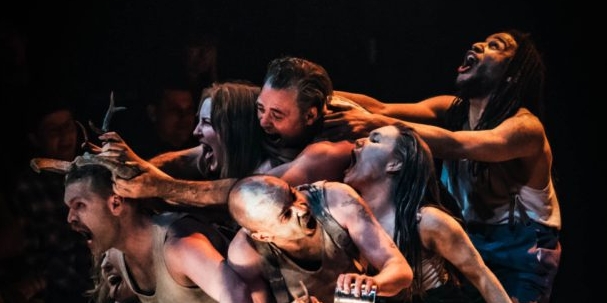For a play which is famously bad luck among actors (they aren’t even supposed to speak its name) Flabbergast Theatre show some pluck in taking on this as their first narrative piece. Previous work of the company has been in clown, puppetry and immersive theatre and their expertise in all is apparent throughout their performance. It is worth arriving early for Macbeth as the cast, while the audience take their seats, perform a demonic dance number with writhing, groaning and wailing covered in mud.
In a production which forefronts the interplay of masculinity and female power, a cast of eight wear near-identical dress of beige or brown skirts and braces, giving balletic performances to an accompaniment of drums, chimes and songs. The ensemble has clearly worked a long time, guided by performance director Matej Matejka, to perfect performances of actors who are giving everything to this explosive work of physical theatre. They are prancing and whinnying, spitting wine and reaching for a high expression of the emotional truth of this play of bloody ambition and revenge.
Nordic influence is obvious in the horns, drumbeats and ritual of some of the scenes and in the persistent presence of Dale Wylde playing a Loki-like character who leers and mocks throughout as a diabolical court fool. He plays to the full the only comic scene in Macbeth, the Porter’s reluctance to answer the door after the regicide, which Wylde portrays as a clown mime.
Lady Macbeth as played by Briony O’Callaghan is gloriously wicked, handing out party hats for the banquet scene after the murders in a grotesque celebration of kingship. Director Henry Maynard remarks that he wanted a forced celebration scene so when Lady Macbeth says ‘You have displaced the mirth’ we have actually seen some mirth which is notably lacking in most performances of the play. Music is integral, with drumming, bells and gongs. At one time the cast take up a religious chant like an African mass and finish the production with a brilliant harmony for the folk song ‘Three Ravens.’
Flabbergast gives us an evening of startling vividness, but the production is not without its problems. It feels like the very enthusiasm for the piece militates against meaning at some points. All the words are there and in the right order but played with such physicality and expressiveness that it would be difficult to follow for those who don’t know the play.
The pitch is set high from the beginning and is all performed at such an extreme that when the play in any version ramps up such as for Lady Macbeth’s madness, there is nowhere for it to go, this scene looks as intense as the last. Only in the speech after her death in the ‘Tomorrow and tomorrow and tomorrow’ speech does Macbeth, commandingly played by Henry Maynard, create a change of tempo. That said, the company has to be congratulated in presenting a refreshingly different interpretation of a traditional play.

